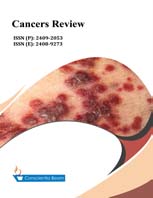Prognostic Factors in Patients with Squamous Cell Carcinoma of the Oral Tongue Treated With Adjuvant Therapy Following Surgery
DOI:
https://doi.org/10.18488/journal.95/2014.1.1/95.1.16.32Abstract
Background. There is limited data on adjuvant treatment following surgery in patients with squamous cell carcinoma of the oral tongue. Aims. This retrospective study investigates prognostic value of different factors for local relapse-free survival (LRFS), regional relapse-free survival (RRFS), disease-free survival (DFS), and overall survival (OS) in patients with oral tongue cancer treated with adjuvant therapy following surgery. Materials and methods. Forty six patients with surgically treated oral tongue cancer were enrolled in the analysis. Adjuvant therapy consisted of postoperative radiotherapy (PO-RT) or postoperative concurrent chemoradiotherapy (PO-CCRT). All patients received three dimensional conformal radiotherapy. Weekly cisplatin was given as concurrent chemotherapy. Identification of prognostic factors for survival was done with univariate analysis. Multivariate analysis was used for factors confirmed as significant on univariate analysis. Results. Independent prognostic factors negatively influencing LRFS, DFS, and OS were ECOG performance status (p = 0.002, p = 0.013 and p = 0.022, respectively), overall stage (p = 0.011, p = 0.010 and p = 0.009, respectively), and pathologic nodal classification (p = 0.016, p = 0.011 and p = 0.015, respectively). Surgical margin status was an independent prognostic factor for RRFS, DFS, and OS (p = 0.032, p = 0.027 and p = 0.028, respectively). The type of adjuvant treatment used was independently prognostic for lower rates of LRFS and DFS (p = 0.029 and p = 0.010, respectively). Conclusions. Positive postoperative nodal status and close or positive resection margins had the most prominent negative prognostic influence on patients’ survival.

